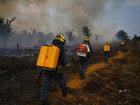A senior German state official announced his resignation Wednesday amid questions over his management of deadly floods that hit his region last year.
Roger Lewentz, the interior minister of the western state of Rhineland-Palatinate for the past 11 years, said he was "taking the political responsibility for mistakes that were made in my area of responsibility."
 Full Story
Full Story
Some 477 pilot whales have died after stranding themselves on two remote New Zealand beaches over recent days, officials say.
None of the stranded whales could be refloated and all either died naturally or were euthanized in a "heartbreaking" loss, said Daren Grover, the general manager of Project Jonah, a nonprofit group which helps rescue whales.
 Full Story
Full Story
Gopher tortoises — burrowers whose extensive homes shelter many other animals — are generally doing well and need federal protection only in the small area where they were declared threatened 35 years ago, the government said Tuesday.
Thanks to extensive conservation work and recently discovered populations, Georgia's state reptile is no longer a candidate for protection in the bulk of its range: Florida, south Georgia, most of coastal Alabama and a sliver of South Carolina, the U.S. Fish and Wildlife Service said.
 Full Story
Full Story
New Zealand's government on Tuesday proposed taxing the greenhouse gasses that farm animals make from burping and peeing as part of a plan to tackle climate change.
The government said the farm levy would be a world first, and that farmers should be able to recoup the cost by charging more for climate-friendly products.
 Full Story
Full Story
Environmental campaign group Greenpeace on Wednesday denounced as "dangerous" a massive ski resort under construction in northwest Saudi Arabia that this week was named host of the 2029 Asian Winter Games.
 Full Story
Full Story
Reforms to the way that societies collect and treat their waste could slash global emissions of planet-heating methane, a new report said Monday, noting that simple measures like composting were a climate solution "staring us in the face."
 Full Story
Full Story
The EU parliament on Tuesday passed a new law requiring USB-C to be the single charger standard for all new smartphones, tablets and cameras from late 2024.
 Full Story
Full Story
As the sun beats down on Iraq, most people swelter in their concrete homes -- but not the inhabitants of one mountain town known for its ancient and cool stone houses.
 Full Story
Full Story
September has come and gone, marking another painful milestone for the world's largest rainforest. It's the worst month for fire in the Amazon in over a decade.
Satellite sensors detected over 42,000 fires in 30 days according to Brazil's national space institute. It is the first time since 2010 that fires in the Amazon surpassed 40,000 in a single month.
 Full Story
Full Story
King Charles III has decided not to attend the international climate change summit in Egypt next month, fueling speculation that the new monarch will have to rein in his environmental activism now that he has ascended the throne.
The Sunday Times newspaper reported that the decision came after Conservative Prime Minister Liz Truss objected to Charles attending the conference, known as COP27, when she met with the king last month at Buckingham Palace.
 Full Story
Full Story



